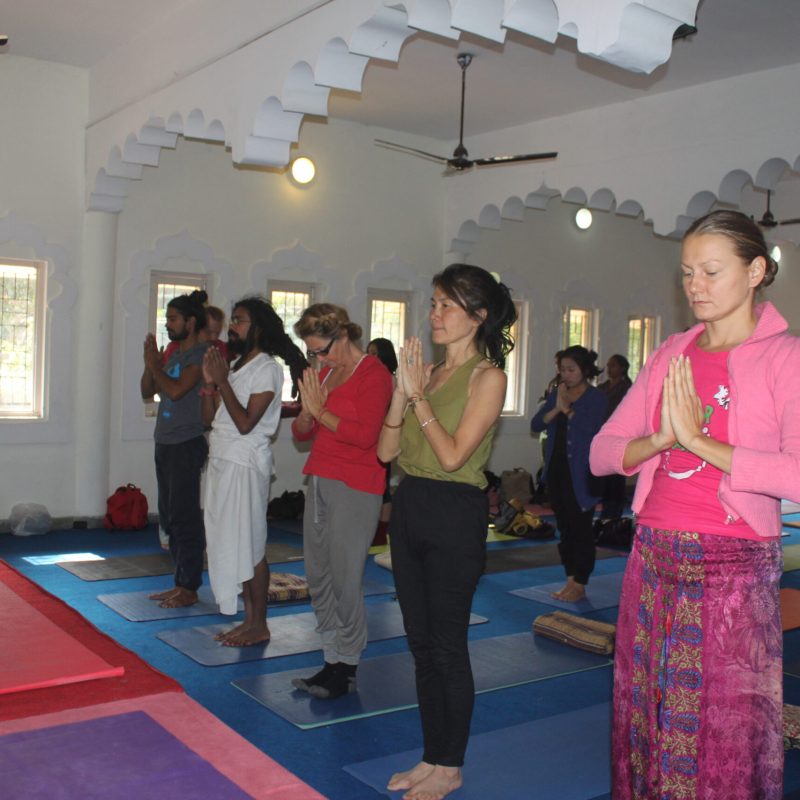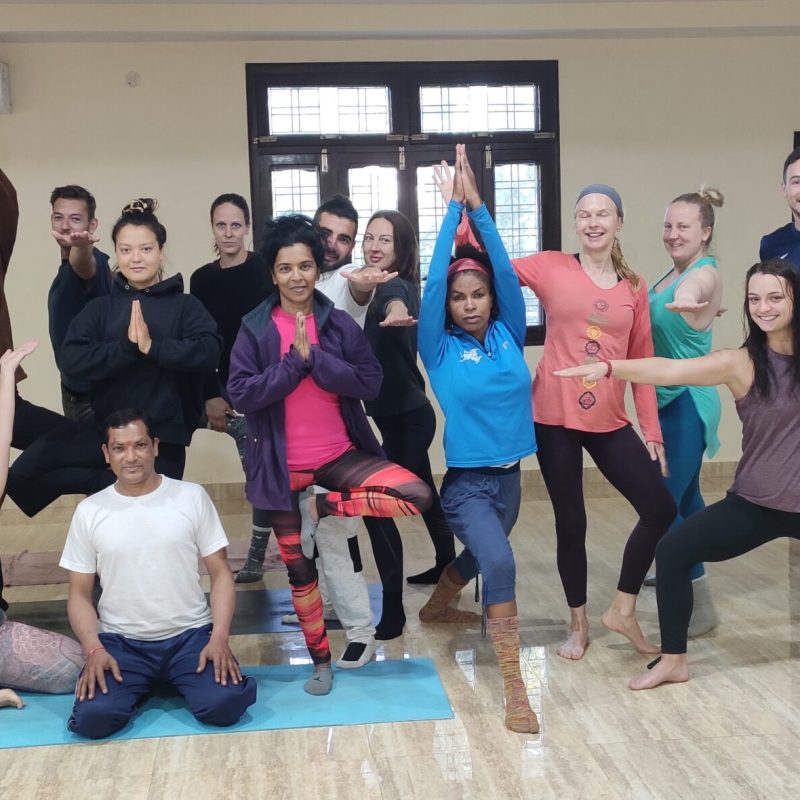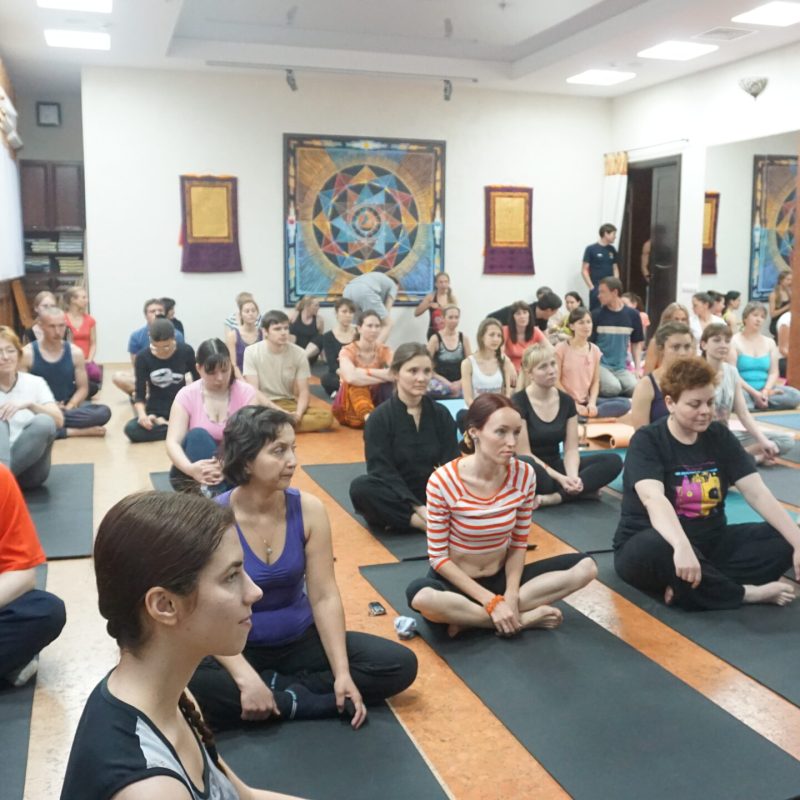Moksha Through Bhakti Yoga
Soham Yoga School Rishikesh, India
Moksha Through Bhakti Yoga
Introduction
Bhakti Yoga, as elucidated in the Bhagavad Gita, is the path of devotion and love towards the divine. The Gita presents Bhakti Yoga as one of the primary paths to spiritual liberation (moksha), alongside Karma Yoga (the path of selfless action) and Jnana Yoga (the path of knowledge). Consequently, here’s a detailed exploration of Bhakti Yoga according to the Bhagavad Gita.
Key Verses and Their Interpretations
The Essence of Bhakti Yoga
Bhagavad Gita 9.22:
“ananyāś cintayanto māṁ ye janāḥ paryupāsate teṣāṁ nityābhiyuktānāṁ yoga-kṣemaṁ vahāmy aham”
Translation: “To those who are constantly devoted and who worship Me with love, I give the understanding by which they can come to Me.”
Interpretation: This verse emphasizes the divine care and support provided to devotees who are unwavering in their devotion and constantly meditate on God. Consequently, this verse highlights the assurance that comes with dedicated worship. Therefore, those who are devoted can trust in divine guidance and support.
Surrender and Devotion
Bhagavad Gita 18.66:
“sarva-dharmān parityajya mām ekaṁ śaraṇaṁ vraja ahaṁ tvāṁ sarva-pāpebhyo mokṣayiṣyāmi mā śucah”
Translation: “Abandon all varieties of dharma and just surrender unto Me. I shall deliver you from all sinful reactions. Do not fear.”
Interpretation: Krishna urges complete surrender to Him, assuring that He will liberate the devotee from all sins and lead them to salvation. Therefore, this highlights the importance of surrender and trust in Bhakti Yoga. By surrendering to the divine, one finds peace and freedom from fear.
Equal Vision
Bhagavad Gita 9.29:
“samo ‘haṁ sarva-bhūteṣu na me dveṣyo ‘sti na priyaḥ ye bhajanti tu māṁ bhaktyā mayi te teṣu cāpy aham”
Translation: “I am equally disposed to all living entities. There is no one I envy, nor am I partial to anyone. But whoever renders service unto Me in devotion is a friend, is in Me, and I am also a friend to him.”
Interpretation: Krishna explains that He is impartial and equally disposed to all beings. However, those who worship Him with devotion attain a special place in His heart. This underscores the reciprocal nature of divine love. Thus, devotion brings one closer to the divine in a unique and personal way.
The Simplest Form of Worship
Bhagavad Gita 9.26:
“patraṁ puṣpaṁ phalaṁ toyaṁ yo me bhaktyā prayacchati tad ahaṁ bhakty-upahṛtam aśnāmi prayatātmanaḥ”
Translation: “If one offers Me with love and devotion a leaf, a flower, fruit or water, I will accept it.”
Interpretation: This verse teaches that the simplest offerings, when made with sincere devotion, are accepted by the divine. Thus, it emphasizes the importance of the sentiment behind the offering rather than the offering itself. In this way, Bhakti Yoga highlights the power of genuine devotion over material wealth.
The Qualities of a Devotee
Bhagavad Gita 12.13-14:
“adveṣṭā sarva-bhūtānāṁ maitraḥ karuṇa eva ca nirmamo nirahaṅkāraḥ sama-duḥkha-sukhaḥ kṣamī saṅga-varjitaḥ”
Translation: “One who is not envious but is a kind friend to all living entities, who does not think himself a proprietor and is free from false ego, who is equal in both happiness and distress, who is tolerant, always satisfied, self-controlled, and engaged in devotional service with determination, his mind and intelligence dedicated to Me, such a devotee is very dear to Me.”
Interpretation: Krishna describes the qualities that endear a devotee to Him. These include non-enviousness, friendliness, compassion, humility, tolerance, and unwavering devotion. As a result, this verse serves as a guideline for those aspiring to practice Bhakti Yoga. Furthermore, it sets a high standard for personal conduct and spiritual practice, ensuring that devotees embody these virtues in their daily lives.
The Path and Practice of Bhakti Yoga
Shravanam (Listening)
Firstly, listening to the divine names, glories, and stories of the Lord as recounted in scriptures and devotional songs is essential. Additionally, regularly attending spiritual discourses and satsangs (gatherings of devotees) strengthens one’s faith and understanding.
Kirtanam (Chanting)
Furthermore, singing or chanting the divine names and glories of the Lord elevates the soul. Participating in kirtans and bhajans, which are congregational singing sessions, fosters a sense of community and shared devotion.
Smaranam (Remembering)
Constantly remembering the divine through meditation, prayer, and mindfulness deepens one’s connection to God. Moreover, keeping the Lord in one’s thoughts throughout the day reinforces this bond.
Padasevanam (Serving the Lord’s Feet)
Additionally, offering service to the deity in temples or personal shrines is an act of devotion. Engaging in acts of devotion and care towards the deity’s image or idol further expresses one’s love and dedication.
Archanam (Worship)
Performing rituals and pujas (worship ceremonies) with offerings of flowers, food, and other items honors the divine. Following prescribed methods of worship with devotion ensures that one’s actions are pleasing to the Lord.
Vandanam (Prayers)
Offering prayers and prostrations to the Lord is a fundamental practice. Furthermore, expressing gratitude, seeking blessings, and communicating with the divine through heartfelt prayers strengthens one’s relationship with God.
Dasyam (Servitude)
Seeing oneself as a servant of the Lord and performing duties with that attitude exemplifies humility. Serving the Lord in all activities, considering every act as service to the divine, cultivates a spirit of selflessness.
Sakhyam (Friendship)
Developing a friendly relationship with the Lord, sharing thoughts and feelings as one would with a close friend, is crucial. In addition, trusting and confiding in the Lord as a dear companion fosters a personal and intimate connection.
Atmanivedanam (Complete Surrender)
Finally, surrendering oneself entirely to the divine will epitomizes the essence of Bhakti Yoga. Offering all actions, thoughts, and life to the service of the Lord completes the cycle of devotion and surrender.
Summary
In summary, Bhakti Yoga, as outlined in the Bhagavad Gita, emphasizes a path of love, devotion, and surrender to the divine. Key verses highlight the importance of unwavering devotion, complete surrender, and the qualities of a true devotee. Furthermore, the practices of Bhakti Yoga include listening, chanting, remembering, serving, worshiping, praying, serving in a spirit of servitude, befriending the Lord, and complete surrender. Through these practices, devotees cultivate a deep personal relationship with the divine, leading to spiritual fulfillment and liberation.
Explore Our Range of Upcoming Yoga Training Courses Rishikesh

100 Hour Yoga Teacher Training in Rishikesh (India)
Duration: 14 Days
Module: Residential with Meal
Accommodation: Shared Room
Certification: Yoga Alliance USA
Course Fee: 699 USD
Yoga Style: Hatha Yoga

200 Hour Yoga Teacher Training in Rishikesh (India)
Duration: 25 Days
Module: Residential with Meal
Accommodation: Shared Room
Certification: Yoga Alliance USA
Course Fee: 999 USD
Yoga Style: Hatha Yoga

300 Hour Yoga Teacher Training in Rishikesh (India)
Duration: 28 Days
Module: Residential with Meal
Accommodation: Shared Room
Certification: Yoga Alliance USA
Course Fee: 1349 USD
Yoga Style: Hatha Yoga

500 Hour Yoga Teacher Training in Rishikesh (India)
Duration: 55 Days
Module: Residential with Meal
Accommodation: Shared Room
Certification: Yoga Alliance USA
Course Fee: 2699 USD
Yoga Style: Hatha Yoga

07 Days Yoga Retreats in Rishikesh (India)
Duration: 07 Days
Module: Residential with Meal
Accommodation: Shared Room
Certification: Yoga School
Course Fee: 499 USD
Style: Yoga Retreats

10 Days Yoga Retreats in Rishikesh (India)
Duration: 10 Days
Module: Residential with Meal
Accommodation: Shared Room
Certification: Yoga School
Course Fee: 649 USD
Style: Yoga Retreats




